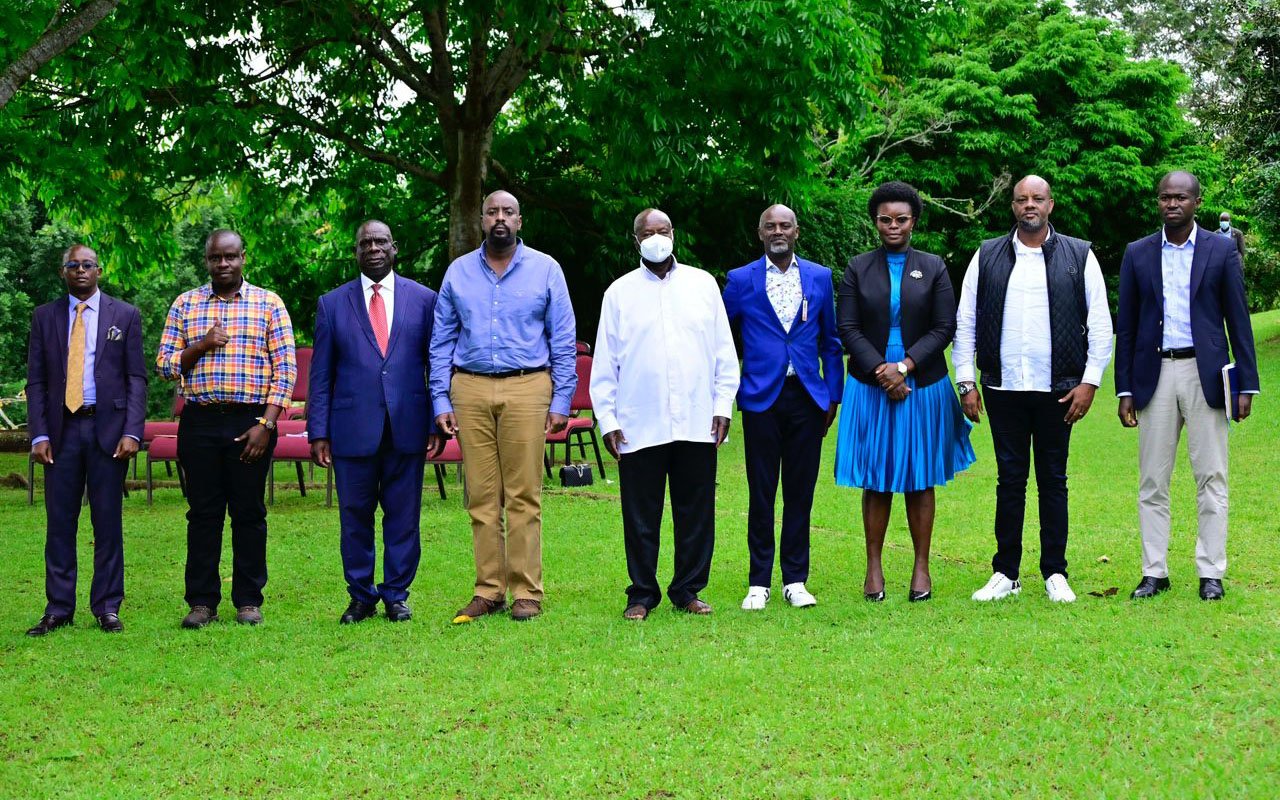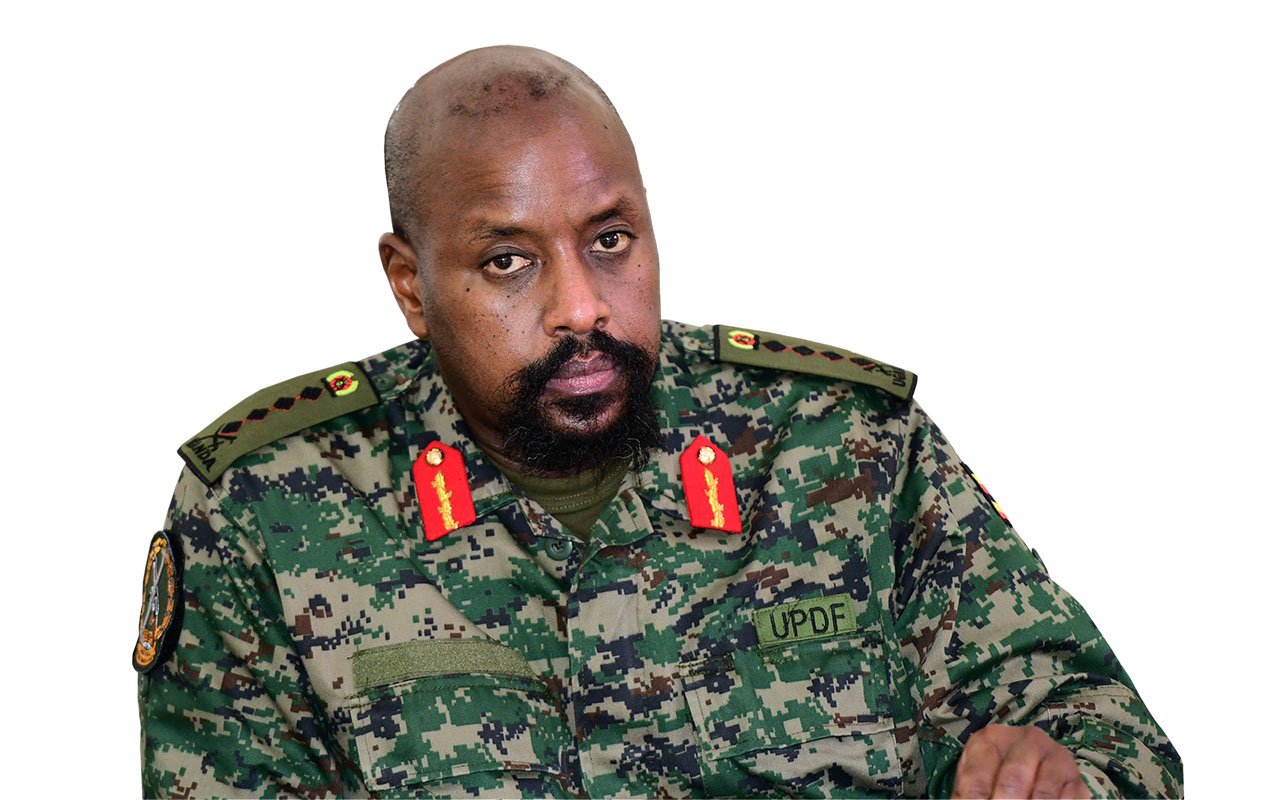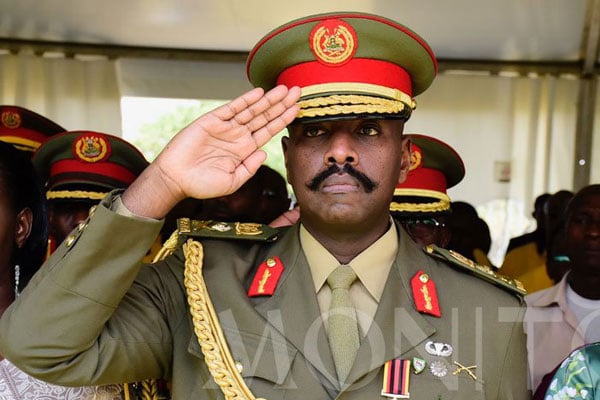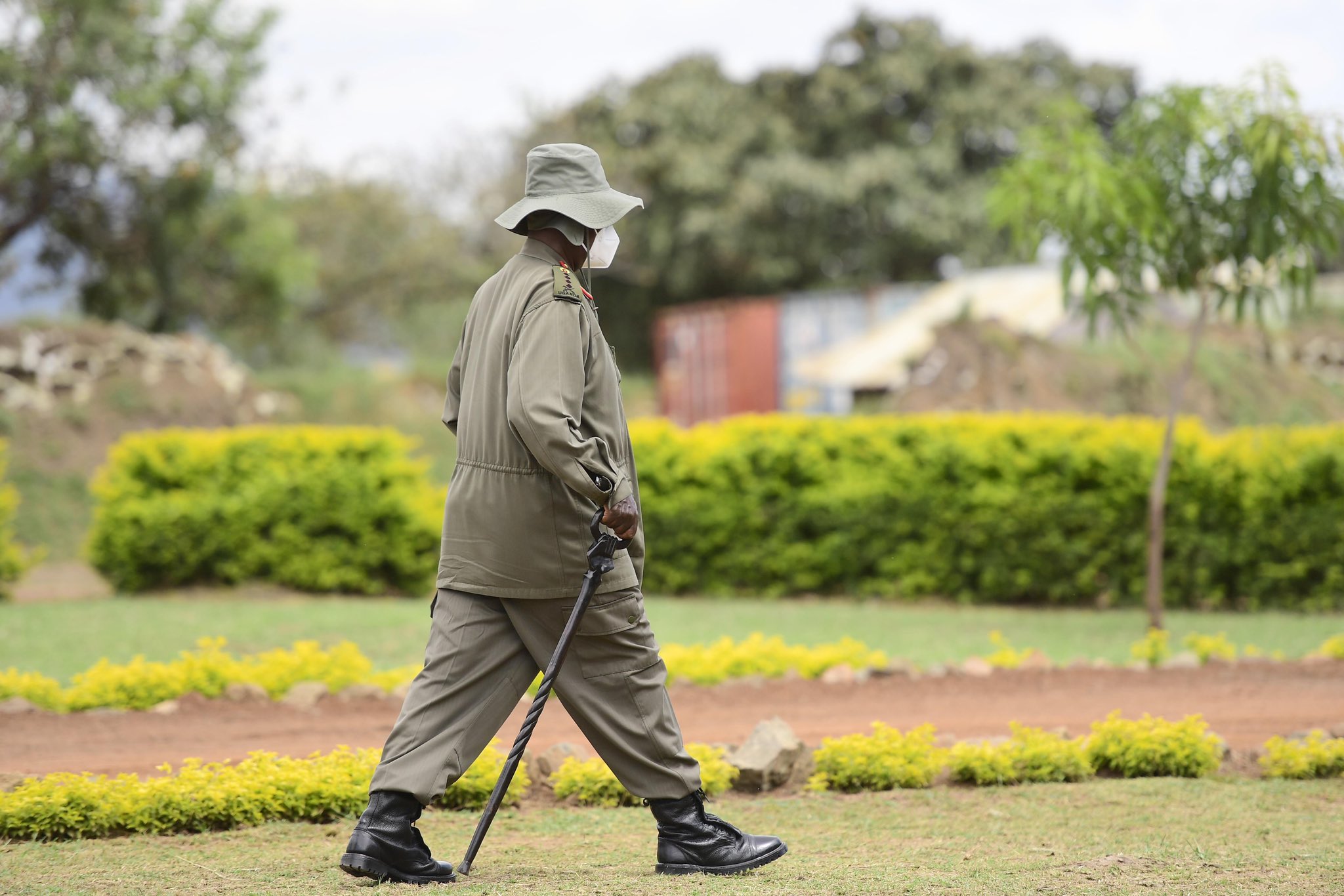Prime
The reshuffle, Muhoozi’s PLU, 2026 elections and transition

President Museveni (wearing mask) meets members of the MK Movement, recently renamed the Patriotic League of Uganda, which is chaired by his son Gen Muhoozi Kainerugaba (fourth left), in 2023. PHOTO/COURTESY
What you need to know:
- The shakeup saw President Museveni’s son, Gen Muhoozi Kainerugaba, who had until Thursday been a Senior Presidential Advisor, named Chief of Defence Forces (CDF). Whereas Gen Muhoozi is one of the pieces that were moved, his hand can be seen in the movements.
On an evening of major shakeups, President Museveni on March 21 moved pieces in both Cabinet and the military. Moving some, dropping others and bringing in new faces.
Dr Mary Goretti Kitutu and Ms Agnes Nandutu, both of whom are on trial in the Anti-Corruption Court for alleged misappropriation of iron sheets meant for the people of Karamoja, were dropped. Mr Vincent Bamulazeki Ssempijja was also moved from Defence and appointed a presidential advisor.
Karamoja on Museveni’s mind
Among those that were moved on promotion was Mr Peter Lokeris, who was moved from the Ministry of Energy and Mineral Development where he has been a junior minister, to the Ministry of Karamoja Affairs.
The Karamoja Parliamentary Group (KPG) had always demanded the appointment of a person from Karamoja to head the Karamoja docket on grounds that the region has been best served when a native has been in charge.
“There is a conviction that a person from Karamoja would manage resources and policies better. That is why at the time of appointment (of the previous Cabinet) some of us had suggested a hybrid. We suggested that if the President cannot get a Karimojong (to head the ministry) at least one of the persons in the docket should be from Karamoja; should have some context about the region,” Mr John Bosco Ngoya, the MP for Bokora County, said in a previous interview.
Members of KPG said the disarmament exercise was testimony to that.
“The foundation of some of the good things that have happened was laid by Lokeris. For example, the disarmament exercise. It was during his time that vigilantes were recruited. Their sole purpose was not just to provide alternative security solving mechanisms, but to also identify and register how many guns were in the region. Lokeris brought in everybody who knew how the Karachunas (warriors) were operating,” Mr Ben Baatom Koryang, the secretary of KPG who is also the Dodoth West MP, told Sunday Monitor also in a previous interview.
Mr Museveni has now acquiesced to the demand, naming Mr Lokeris, who was minister of State for Karamoja between 1996 and 2006.

Incoming Chief of Defence Forces, Gen Muhoozi Kainerugaba. Photo/File
PLU factor
The shakeup also saw President Museveni’s son, Gen Muhoozi Kainerugaba, who had until Thursday been a Senior Presidential Advisor on Special Operations, named Chief of Defence Forces (CDF). Whereas he is one of the pieces that were moved, his hand can be seen in the movements.
Among the new Cabinet appointees is Mr Balaam Barugahara, who was named State minister for Youth, and Ms Lilian Aber, the Kitgum Woman Member of Parliament, who was appointed State minister for Relief and Disaster Preparedness.
The two were part of a group of individuals who claim to be ideological bedfellows of Gen Muhoozi, who converged in Naguru, a suburb of Kampala, last month where they launched the Patriotic League of Uganda (PLU). Gen Muhoozi is the chairman of PLU.
The two, together with Gen Muhoozi and four others – Kasambya County MP David Kabanda, Igara East MP Michael Mawanda, Mr Frank Gashumba and journalist Andrew Mwenda – are the sponsors and promoters of the organisation. PLU effectively replaced the MK Movement.
Also on the list of new entrants is Ms Phionah Nyamutoro, the National Female Youth Member of Parliament (MP), who has been named State minister for Mineral Development.
Ms Nyamutooro, just like the other two, have been ardent supporters of the MK Movement.
The real intentions of the PLU, just like those of the MK Movement before it, remain very ambiguous, hazy even.
When the MK Movement first emerged, it was said to have been meant to serve the interest of Gen Muhoozi. Those interests were never defined.
However, the birthday run in Kampala, birthday parties in different parts of the country, presiding over the a “Muhoozi Project Tournament” in Arua on October 22, 2022, and the October 27, 2022, tweet, in which he declared his intentions to contest the presidency, seemed to suggest that he would be challenging his father for the presidency in 2026.
Mr Wandera Ogalo, a constitutional lawyer and former legislator in both the 6th Parliament and the East African Legislative Assembly (EALA), thinks that Ugandans read the signals wrong.
The MK Movement, he says, was always about trying to neutralise the influence of National Unity Platform (NUP) and its leader, Mr Robert Kyagulanyi, alias Bobi Wine, on the youth vote.
“They did not come up with the idea that they really wanted power. This MK Movement was really brought up to weaken the NUP. Museveni got taken aback with how youth would run with Bobi Wine. So he deliberately set up these people to try and hype off support for Bobi Wine among the young people,” Mr Ogalo says.
He argues that this explains why the MK Movement’s focus was on sports, culture and entertainment, which are major interests for the youth.
“Referring to him on social media as ‘our next president’, ‘generational leader’ and ‘the leader of our generation’ was always meant to take the focus away from Bobi Wine,” he adds.
The curtain was brought down on the activities of the MK Movement in June last year after a section of MPs complained to Mr Museveni that some of the people that they had defeated in the previous elections had jumped onto the MK Movement and were using it to campaign against them.
Some members who were part of the Movement have since indicated that the President’s intervention and the legal challenges, including the suit that human rights lawyer Gawaya Tegulle filed in the Constitutional Court on May 7, 2022, accusing Gen Muhoozi of operating in contravention of Article 208(2) of the Constitution, which provides that the Uganda People’s Defence Forces must, among others, be non-partisan, forced them to form PLU.
The case in which Mr Tegulle is suing both the Attorney General and Gen Muhoozi in his individual capacity has remained pending in the Constitutional Court.
It should, however, be noted that PLU has been dogged by the same lack of clarity of purpose that dogged the MK Movement.
Mr Kabanda insists that it is a civil society organisation that brings together different actors from all sides of the political spectrum for purposes of sanitising the politics of Uganda.
“From the onset we said PLU is not a political party. It is just a civic organisation that welcomes all people. It intends to promote patriotism. We are encouraging our (NRM) supporters and supporters of the Opposition to think big – that Uganda is bigger than our political parties,” Mr Kabanda says.
This, he says, explains why the launch was attended by at least three members of Mr Museveni’s Cabinet, 68 Members of Parliament and at least 40 chairpersons of district local governments drawn from both the ruling party and Opposition.

A man casts his vote in Kampala in 2021. PHOTO/ FILE
Election mode
We should, however, not forget that the National Resistance Movement (NRM) has already engaged some important gears in as far as preparation for the 2026 election cycle is concerned.
The NRM secretary general, Mr Richard Todwong, already told the country as far back as December 14, 2022, that the party’s central executive committee (CEC) had already identified Mr Museveni as its candidate for 2026.
That was reaffirmed early in January last year by Vice President Jessica Alupo during celebrations to mark 35 years of Entebbe Church of Uganda archdeaconry.
“President Museveni will be with us in 2026. Therefore, I appeal to you to support him like you have been doing,” Ms Alupo said.
That has since been followed by various elders’ appeals calling on Mr Museveni “not to get off the main road” and endorsements by senior party leaders and youths in diverse parts of Uganda.

NUP leader Robert Kyagulanyi (centre). Photo/File
Transition
Developments in the NRM mean that Mr Museveni is not going anywhere, at least not before the 2026 elections.
That means that any talk about the kind of transition that the Opposition has been talking about – one that entails Museveni leaving office, sharing of power and amendments to the Constitution – will not be taking place.
A member of Mr Museveni’s Cabinet, who talked to Sunday Monitor on condition that they are not named, has since indicated that any talk of a transition will be on Mr Museveni’s terms, with him moving the pieces just like he did on Thursday.
“2026 is not just about extending Mr Museveni’s stay in power. It would also mean that the transition takes place on his terms. He will be in charge of managing it,” the minister says.
The minister’s comments would in light of Thursday’s appointment of Gen Muhoozi to the post of CDF and naming of some PLU members to the Cabinet fit in well with the minister’s take.
The appointment of Mr Barugahara to head the Youth docket falls in with Mr Ogalo’s conclusion that Mr Museveni has an eye on the youth vote. How he goes about winning them over for Mr Museveni and the NRM is the real issue here.
What next?
The question for now is what next for the PLU?
Mr Kabanda says PLU will stay with the hope of promoting clean politics and patriotism through public engagements.
“In Kenya, after elections parties come together for the good of their country. In Uganda, if you see me with a NUP supporter tomorrow they will now start saying Kabanda has gone to bribe someone from NUP. We are saying you, Tanga Odoi [NRM electoral commission chief], cannot be there in the NRM and start insulting Kasule Lumumba who is your secretary general,” he says.
Other sources within PLU disagree with Kabanda, saying there are plans for the organisation to morph into a political party.
Whereas Gen Muhoozi has already voiced his intentions to one day become president, he has no known constituency besides being his father’s son, they told Monitor.
Even though people like Capt Mike Mukula, the NRM vice chairman for eastern Uganda, has been urging Gen Muhoozi to be part of the transition, but within the ambits of the NRM, historical members of the party like Gen Kahinda Otafiire have been quite vocal in their opposition to any sort of plan that would see him succeed his father.
Besides, Gen Muhoozi has over the last several years been quite critical of the NRM.
“I am listening to the outcry of our people for change. I am with the people! Whatever NRM has become certainly does not represent the people of Uganda,” he once tweeted.
“I certainly do not believe in NRM. In Marxist terms, it is probably the most reactionary organisation in the country,” he added in another tweet.
“In the circumstances, he has no choice but to have his own party and build his own brand. That would not only make him his own man, but it would also help him negotiate with any other parties, especially the NRM, on equal terms,” says the PLU source that preferred not to be named.
Other sources indicated that this could also be part of a greater scheme to weaken NUP’s numerical strength in Parliament.
Already there are indicators that Gen Muhoozi has quite a number of MPs who are loyal to him. Those would be expected to join his new party. The numbers would knock NUP off its perch as the biggest Opposition party.
Could that be part of Mr Museveni’s calculation as he moves to manage the transition?
“Politics is dynamic. The man (Mr Museveni) might see and say by the way, although now the other one (NUP) is weakened, I can still get another advantage out of this. That is possible that PLU becomes a political party,” Mr Ogalo says.
Such a scenario would mean that Gen Muhoozi would in the months leading up to the 2026 General Election resign as CDF and hit the campaign trail and lead his party into becoming the second biggest party in Parliament.
Prof Makara says that scenario is not too farfetched.
“This is scenario building, but the possibility of Muhoozi being on the ballot paper against his father is very much alive. He is discharged from the army, he campaigns, his party becomes the biggest Opposition party, they enter into a memorandum of understanding with his father and rule together just like [Justice minister Nobert] Mao is ruling with Mr Museveni,” Prof Makara says.
Would that be an option in Mr Museveni’s plan to manage the transition and have it on his own terms?




